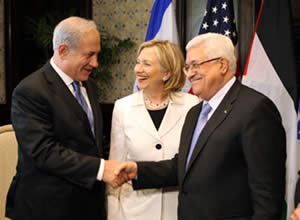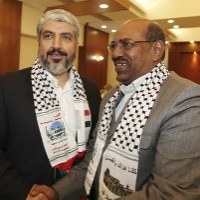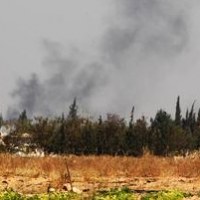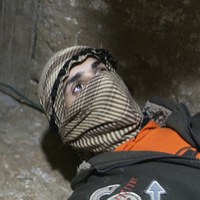![]()
Wed, Sept 15, 2010 | The Meir Amit Intelligence and Terrorism Information Center

Israeli Prime Minister Benyamin Netanyahu, Palestinian Authority Chairman Mahmoud Abbas and American Secretary of State Hillary Clinton at the talks in Sharm el-Sheikh (Wafa News Agency, September 14, 2010)
Hamas Continues to Criticize the Israeli-Palestinian Negotiations
Continuing the relaunching of the peace process in Washington, on September 14 there was a summit meeting in Sharm el-Sheikh attended by Israeli Prime Minister Benyamin Netanyahu and Palestinian Authority Chairman Mahmoud Abbas. Egyptian President Hosni Mubarak, American Secretary of State Hillary Clinton and American envoy to the Middle East George Mitchell also attended.
On the eve of the meeting the media covered the disagreement between Israel and the Palestinians over construction in the settlements. The Israeli position is that the construction freeze in Judea and Samaria is not part of the negotiations but a one-time gesture made by the Israeli government to show the seriousness of its intentions toward peace and to kick-start the process. The Israeli position is that the issue of the settlements will be negotiated as part of the core issues during the final status agreement. On the Palestinian side, Mahmoud Abbas has made it clear that the Palestinians demand that Israel maintain the freeze, threatening that if Israel renews construction, the Palestinians will abandon the negotiations (Mahmoud Abbas interviewed by Al-Ayam, September 6, 2010). Interviewed by Al-Quds on September 6, Mahmoud Abbas said that if pressure is exerted on the Palestinian Authority to waive the 1967 borders, the refugees or any other of the Palestinian basic issues, he would “take his briefcase and leave.”
Israeli Prime Minister Benyamin Netanyahu opened the September 12 weekly cabinet meeting by emphasizing the importance of recognition of the State of Israel as the national home of the Jewish people [to which the Palestinians object]. He said that “The conflict between us and the Palestinians, as opposed to other conflicts that were resolved by peace agreements, is over the same piece of ground. We say that the solution is two states for two peoples, meaning two national states, a Jewish national state and a Palestinian national state.” He added that to his regret, he had not yet heard the Palestinians use the phrase “two sates for two peoples,” which, he said, was the true basis for an end to the claims against the State of Israel and for the end of the conflict between the two peoples. He continued, “[j]ust as we are asked to recognize the Palestinian national state, we also demand and expect the Palestinians to recognize a Jewish state, the State of Israel, as the national state of the Jewish People. This is the true foundation of peace.”[1]
Statements from Hamas
Senior Hamas figures and the Hamas-affiliated media continued to attack Israel and the Palestinian Authority over the relaunching of direct negotiations and the PA security forces’ extensive detentions of Hamas operatives in Judea and Samaria after Hamas’ shooting attacks. Reports of the American clergyman’s intention to burn Qur’ans on September 11 (which was cancelled) were exploited for anti-American incitement.
The main points made by senior Hamas figures were the following:
* The negotiations between Israel and the Palestinian Authority had no legitimacy or value, either Arab or international. The Palestinian Authority did not have the right to represent or negotiate in the name of the Palestinian people, and therefore any results of the negotiations did not commit the Palestinians (Safa News Agency, September 10, 2010).
* The Izz al-Din al-Qassam Brigades in Judea and Samaria were asked to remain firm against Israel and the Palestinian Authority’s security forces, and to “sacrifice more, because they are the spearhead of the jihad and the resistance, and the only legitimate weapon defending the Palestinian people and the homeland” (Safa News Agency, September 10, 2010). Hamas called the detentions a “national betrayal” (Hamas’ Palestine-info website, September 8, 2010), and warned the PA’s security forces that “the weapons that reached the heart of the occupier can reach you as well” (Al-Resalah.net, September 8, 2010).
* Praise for the path of terrorism: Ahmed al-Jaabari, senior operative in the Hamas military wing, posted a letter on the Al-Bayan Center website to all Izz al-Din al-Qassam Brigades operatives for the end of the Muslim holy month of Ramadan. He called the withdrawal of IDF forces from the Gaza Strip a “partial victory” and criticized the negotiations between the Palestinian Authority and Israel. He said that “the enemy will lower his head only before the sword and gunfire and will not [be made to] flee except by fire and warfare.” He emphasized the adherence of the Izz al-Din al-Qassam Brigades to “all Palestine, from the [Jordan] river to the [Mediterranean] sea, with its capital of Jerusalem,” and said that it was “land of Islam…for ever and ever, until Judgment Day” (Hamas-affiliated Al-Bayan Center website, September 14, 2010).
* Anti-American incitement: Ismail Haniya, head of the de facto Hamas administration in the Gaza Strip, said at the prayers for Eid al-Fitr, the holiday ending Ramadan, that the American clergyman [who wanted to burn Qur’ans on September 11] served the West’s agenda, which wanted to harm the Muslims in “Palestine” and beyond. He called on Allah “to tear to pieces the countries and the existence [itself] of those who want to tear the Qur’an to pieces” (Al-Aqsa TV, September 10 2010).
* Signs of the victory of the Arab-Islamic nation over the United States and the West: Ismail Haniya blessed the “brave Iraqi resistance” which had “defeated” the United States. He added that the West’s armies and plans had collapsed in Afghanistan and Palestine, and praised the changes which had taken place in Turkey, Afghanistan, Iran and even Palestine. He extolled the Turkish people and their leadership for Turkey’s exit from its strategic alliance with Israel (Al-Aqsa TV, September 10 2010).
Note:
[1] Prime Minister Office.



 RSS
RSS











Hamas Continues to Criticize the Israeli-Palestinian Negotiations | #israel #hamas #peace #talks http://j.mp/a1GwTE
RT @CrethiPlethi: Hamas Continues to Criticize the Israeli-Palestinian Negotiations | #israel #hamas #peace #talks http://j.mp/a1GwTE
Hamas Continues to Criticize the Israeli-Palestinian Negotiations …: The Israeli position is that the constructi… http://bit.ly/a0wWRW
Hamas may have some point but I think, the plan of Netanyahu to pursue the negotiation is good enough to be supported. There is no other way to settle the deep-seated problem but to open the negotiations and make a peace agreement to settle the issue at hand. Hamas’ first point is quite vague. If the Palestinian authority is not the legitimate representative to the negotiation process, then who is the true representative of the Palestinian people?